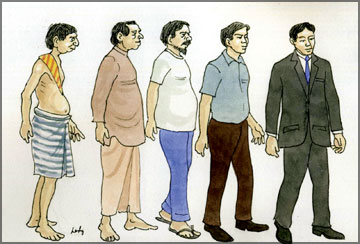Evolving English
Indivara Mahendra
According to Oxford Dictionary, English is the
language with the largest stock of words and arguably used by the
majority of the world both as a mother tongue and second language. This
unique position has paved the way to origination of various varieties
such as American English, Australian English, Singaporean English and
Indian English.
English was introduced as a result of British invasion of Sri Lanka
in two parts: first in 1796 the coastal area and second in 1815 as a
complete colony. There is hardly any proof English was in existence
before the British rule, other than Robert Knox’s account. Naturally the
question may pop in why the English outsmarted its predecessors, the
Portuguese and the Dutch, in both customs and language.

This has two reasons. Portuguese and Dutch did not get a chance to
occupy the whole land. Their rule was confined to coastal area as in the
case of the English during 1796. The second reason is the British had a
large number of countries as colonies hence they could easily instill
the language and customs.
This became a haunting effect even after the British left the Ceylon
in 1948. Still English remained to be the ‘language of aristocracy.’
This did change, but only slightly, with the language shift in the
SWRD Bandaranaike era. Any Sinhala-speaking student, especially with
rural roots, could now go for a decent education given their exam
scores, but still the English was given first-class treatment. This
English, which could be called post colonial English, evolved ever
since. But it happened in quite a different manner, since the English
was confined to a limited number of people who used the language either
as mother tongue or second language.
Oxford English Dictionary’s Sri Lankan English Consultant Richard
Boyle has a different opinion on the genesis of Sri Lankan English: It
appears reasonable to assume that the roots of Sri Lankan English (SLE)
go back to 1796 with the commencement of British dominion over the
maritime provinces of the island then known as Ceylon. However, the real
beginnings occurred some one hundred and fifty years earlier, when
captured British sailors confined to remote villages in the island’s
Kandyan kingdom started using Ceylonese terms conversationally for
everyday items and common fauna and flora with no English equivalent.
One of these sailors, a captain’s son called Robert Knox, managed to
escape from the kingdom in 1679 after nineteen years’ confinement. On
returning to London the following year, Knox made the acquaintance of
Robert Hooke, then Secretary of the Royal Society, who assisted him in
refining his manuscript containing an account of Ceylon, the first in
the English language. Robert Knox’s An Historical Relation of Ceylon
gives a picture of colonial Ceylon, when the country was on the verge of
the English invasion.
Many of the words introduced in the work were entered in the Oxford
English Dictionary. Some of these words are beriberi, bilimbi, cadjan,
calamander, chatty, cutcherry, dagoba, domba, hackery, kokoon, marmala-water,
olla, parangi, patana, poonac, puja and punatoo.
However Boyle points out that “Knox’s liberal use of Sri Lankan words
turned out to be premature.” Most of the words cannot be seen in
post-independence writers’ works, though with the exception of bo-tree,
Buddha, puja, rattan and Vedda.
Richard Boyle compiled a basic list of Sri Lankan English words as
used by Robert Knox (Words by Knox by Richard Boyle; 2004).
Sri Lankan English developed with a limited number of dialects such
as Burgher, Tamil, Muslim, Sinhala communities. There are slight
variations of dialects among communities like Sinhala. Most of the
Sinhalese use English as a second language, whereas most of the minority
communities like Burgher, Tamil and Muslim use it as first language.
Rarely does English come natural to those who use it as a second
language. It’s more likely listening to a book being read. Their
vocabulary is mostly formal.
English - because it is an international language - has a large
number of dialects: eight dialects in Asian region and nine dialects in
India alone. Sri Lankan English (hereafter SLE) is one of the Asian
dialects of English. Although SLE is now a household term, only a few
people are in the know. Some opt for British English without a slight
idea of what SLE is. British English, on the other hand, is commonly
known as Queen’s English. What is SLE? Michael Meyler offers a
considerable explanation. The answer to this question is not as simple
as it may seem.
Even within a small country like Sri Lanka, and even within the
relatively tiny English-speaking community, there are several
sub-varieties of Sri Lankan English. Sinhalese, Tamils, Muslims, and
Burghers speak different varieties; Christians, Buddhists, Hindus and
Muslims have their own vocabularies; the older generation speak a
different language from the younger generation; and the wealthy Colombo
elite (who tend to speak English as their first language) speak a
different variety from the wider community (who are more likely to learn
it as a second language).
SLE is in existence as a major result of geographical division. Sri
Lanka’s geographical position is quite different compared with that of
the United Kingdom. Even within the United Kingdom each country uses a
different dialect; Scottish and Irish accents are distinct, not so easy
to comprehend. |



